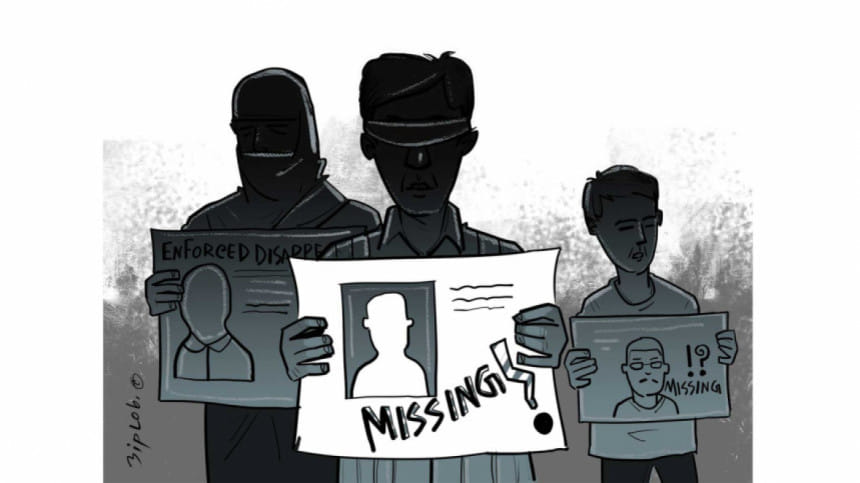Enforced disappearance: Life term or death penalty for culprits

Government officials will face death penalty or minimum life sentence if found guilty of causing the death of enforced disappearance victims, according to a draft ordinance unveiled yesterday.
The draft "Enforced Disappearance Prevention and Redress Ordinance 2025" also has provisions for financial penalties of up to Tk 1 crore for the perpetrators.
Government officials responsible for any enforced disappearance, but not guilty of causing the victims' death, will be sentenced to life term rigorous imprisonment or minimum 10 years in jail, and will also have to pay a fine of up to Tk 50 lakh.
If approved by the president, it will be for the first time that Bangladesh will recognise state-sponsored enforced disappearance and try the perpetrators in criminal courts. Currently, abductions or kidnaps are recognised under criminal laws, but enforced disappearances are not.
The draft ordinance has also provisions for trying the culprits in absentia.
If there are reasonable grounds to believe that the accused has gone into hiding, the court may issue a notice within 20 days of taking the charge sheet into cognisance, directing the accused to appear before the court.
"If the accused does not appear before the court within the specified time mentioned in the notice, the court may proceed to try the case in the absence of the accused," it added.
The Ministry of Law, Justice and Parliamentary Affairs yesterday shared the draft at its first stakeholders' meeting at the Judicial Administration Training Institute in Dhaka where selective jurists and rights activists offered their views on the proposed ordinance.
The draft seeks to set up tribunals, equivalent to district judges' courts, across the country within the 60 days of its formulation.
Crimes under the ordinance will be cognisable, non-bailable and non-compoundable, meaning once the case is filed, the matter cannot be settled outside the court.
At the discussion with the stakeholders, Law Adviser Prof Asif Nazrul said enforced disappearance is a graver crime than murder.
"In some cases, it is even more heinous," he said, adding that their top priorities are ensuring justice for enforced disappearances, murders, and crimes against humanity, particularly for the gruesome incidents that occurred during Sheikh Hasina's authoritarian regime.
"We want to make it difficult for anyone with such dictatorial ambitions to rise again. For that reason, we are enacting various laws and have already initiated judicial processes," he said.
He said they will hold further discussions on the draft with various stakeholders.
According to the draft, enforced disappearance is when any government official, or any person or persons under the authorisation, support, or silent consent of the state or any government authority (a) arrests, detains, abducts, or otherwise deprives any person of liberty; and (b) denies the deprivation of liberty of that person or conceals the fate or whereabouts of that person.
Besides, if any person attempts to commit any offence mentioned in the two subsections mentioned above; directs, assists, or incites the commission of such offence; or conspire in committing such offence would be punished under the law.
Any offence committed under this ordinance shall not be justified on the grounds of a state of war, threat of war, internal political instability, or a state of emergency; nor shall it be justified by the claim that it was committed on the orders of a superior officer or a public authority.
Sharing his opinion on the draft, M Maroof Zaman, a former diplomat and a victim of enforced disappearance himself, said the law should not include capital punishment since it has been formulated in line with an international convention, to which Bangladesh has become a signatory recently.
"The ordinance will have greater international acceptance if the provision for death penalty is dropped," he said.
Barrister Sara Hossain, executive director of Bangladesh Legal Aid and Services Trust, said setting up of tribunals in every district will require a large number of courageous and skilled manpower.
Saira Rahman Khan, acting secretary of rights body Odhikar, suggested that the ordinance include provisions for compensation for the victim families.
She also demanded provisions for protection and secrecy of victims and witnesses, and a system where a victim's family could access the victim's bank accounts and other assets.
Rights activist Rezaur Rahman Lenin also spoke for compensation.
Lawyer Mohammad Shishir Manir said that if incidents of enforced disappearances are widespread and systematic, then they can be prosecuted as crimes against humanity. "We need to specify which cases would be tried under the new tribunals and which would be tried under the International Crimes Tribunal."
Chief ICT Prosecutor Advocate Tajul Islam said the ordinance should stipulate how far the investigation team could go to probe the offence.
"Specially, it should be determined how the probe body would get into organisations like NTMC [National Telecommunication Monitoring Centre] and other armed forces," he said.
On August 29, 2024, the interim government signed the instrument of accession to the International Convention for the Protection of All Persons from Enforced Disappearances.
Soon after taking office on August 8, the government also formed an inquiry commission to investigate cases of enforced disappearances during Hasina's 15-year rule.
During her dictatorship, different law enforcement agencies held victims of enforced disappearance for days, months and even years in several secret detention cells (popularly known as Aynaghar) in inhuman conditions, according to the commission report submitted to the chief adviser earlier this year.
During its investigation, the commission received 758 complaints regarding victims of enforced disappearance. Of them, more than one in every four people (27 percent) never returned. A key finding of the inquiry was that the culture of enforced disappearance "was systematically designed over 15 years to remain undetectable."

 For all latest news, follow The Daily Star's Google News channel.
For all latest news, follow The Daily Star's Google News channel. 







Comments